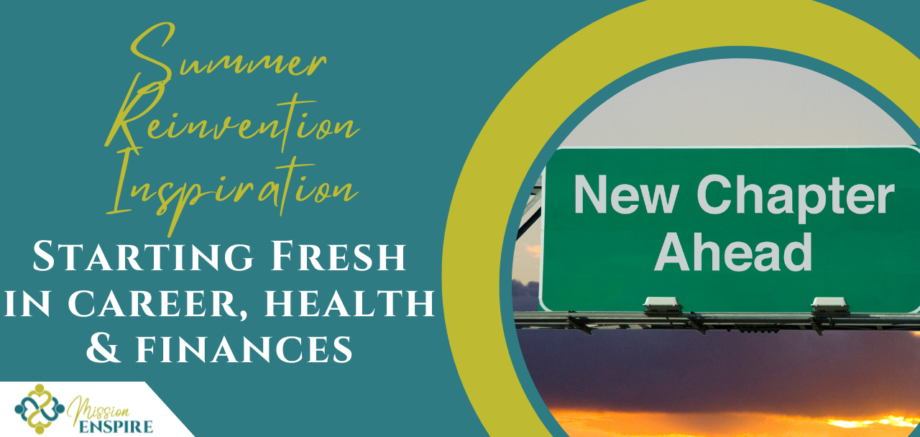Last week, I wrote about how summer can inspire us to want to make a fresh start in some area of our lives. The weather is warmer, the days are long, we start to think about the first half of the year that’s gone by and making the most of the next half of the year. As I mentioned last week, you can make a fresh start on almost anything, but in this week’s post, I thought I’d share some of the most popular areas for making a fresh start in our lives: career, health, and finances.
Change Your Career and Change Your Life
Do you have a role in the workforce? Are you operating from a degree you earned in college, trade school, or a certification program? Have you taken the entrepreneurial route and blazed your own trail, or have you inherited your gig from a family line of business? When did you begin this career? How’s it going so far?
Those are a lot of questions and not usually the sort of thing people ask regularly. Everyone has an origin story of how they started working or doing what they do. Some of us may have gone after our career path with full intention, while some of us would say that we “fell” into our current job or career unexpectedly or by chance or by a series of coincidences. The biggest question for anyone is: How happy are you in your current career and could changing your career change your life?
In our young adulthood, our career direction may be influenced by parental or adult expectations, geography, and economics. For some of us, these factors may play a powerful role in what we decide to do. Our parents may have expectations or our culture may dictate that parents have significant authority over our career choices. Relocation may not be an option so a career may be based on what is available in our area. Whether we have the income to get the right degree or certification may determine what line of work we choose.
As we get older, sometimes our influences change and things like benefits, income, and seniority or security become more important to us. These factors have their own influence on our choices because they often mean stability, access to healthcare, and retirement income. Though we may not have the same interest we once had for the work, the benefits are often outweighing the disadvantages.
If you are in a career that feels tired, old hat, and unfulfilling, it might be time to consider making a change. Sometimes the things we fear losing outweigh the benefits we perceive will come. Sort of how the fear of the unknown is worse than staying in something you know you don’t love, but can predict will be safe. That’s no way to live! Consider these ideas that can help you make a career move:
- Interview someone doing the work you’d like to do and ask for input about what they did to break into that career. Many times folks who are working at doing the thing you find interesting are open to spending some time chatting or mentoring you. Be bold and ask for a moment of their time.
- Learn a new skill. Being open to lifelong learning is an important part of reinvention–and learning a new skill doesn’t have to mean going back to a traditional academic setting (though that is certainly one path for those who feel called to pursue a degree or college-based certification). With free or low-cost resources online through YouTube, Coursera, LinkedIn, or countless other learning portals and websites, there are so many options to learn new skills that can help you prepare for a career change. Digital “badges” or “micro-credentials” offered by some online trainings can also help validate your newly-earned skill or competency to prospective employers.
- Consider becoming an entrepreneur. You may not need any formalized training to change your career. You may simply need to step out in faith and begin. Or if your financial or family responsibilities won’t allow for that level of risk, you may be able to start a side hustle to explore whether your idea has merit and whether it’s something you can see yourself doing full-time someday. (This is similar to the path I’m on right now–continuing my full-time job but launching and growing my business so that in the long term it can generate the same income and financial stability for me that my job does.)
If you feel stuck, bored, or like you’ve missed out in your career, it is not too late to change your career and change your life. (One of my specialties in my coaching practice is helping folks navigate career and life transitions; it’s so gratifying and powerful to see my clients work to get “unstuck” and achieve their goals.)
How’s Your Health: Four Ways to Give Your Health a Fresh Start
Health is a vital component of life and often a key area where people want a fresh start. “Life happens” and through good times and bad, our health can take a back seat to other things. From eating better, to moving more, to addressing concerns or symptoms you have ignored, it might be a good time to make some changes that will give you the new beginning you need. Check out these simple ways to give your health a new start:
- Get a checkup. Visiting your physician should be an annual event at the very least. Having a checkup can prevent illness and address any issues as they come up when they are easier to manage. We should all be seeing our primary care physician for an annual exam, but don’t forget these important exams too: vision exam, dental exam, and other exams important at different ages and stages of life. (If you’re uninsured and have limited income, a Federally Qualified Health Center or similar health clinic may be able to provide preventive care at no cost or on a sliding scale.)
- Discover a new way to eat healthy foods. At any given time, there are food trends designed to get people excited about eating healthier. Trying new foods can be fun, and can help you moderate your fat, salt, or sugar consumption. Browse the internet or the bookstores for enticing new recipes or search YouTube for new cooking shows or videos that spark your interest. (This is another reason why it’s important to get an annual checkup–a physician or similar trained medical practitioner can help make sure that any changes you’re making to your diet are healthy and safe for your individual health situation.)
- Read more. Sometimes the first step to better health starts with research. You may not know what you want to do or how to do it until you learn it. Spend time reading a new book, subscribe to a great blog or magazine, and start educating yourself about healthier lifestyle choices. You never know what will spark a reinvention.
- Find a hobby that encourages movement. Some people resist “working out.” Some of us are afraid of the commitment or the thought of pain and effort. For some of us, maybe we have time constraints or health or mobility conditions that affect our ability to exercise. From sports activities to bird watching, there are unlimited ways to be active that aren’t about lifting weights or running or other “traditional” forms of exercise. Challenge yourself to find a new outdoor (or indoor) hobby that you enjoy and that allows you to fit more movement into your life in whatever way works for you (and again, with guidance from your healthcare practitioner to make sure it’s safe for your own health/physical situation.)
It doesn’t take much to give your health a fresh start. Small changes can start to add up and get you feeling refreshed and renewed about your health.
Do You Need a Fresh Start Financially?
Money doesn’t buy happiness–but it can buy choices. Wherever you are with your income and financial situation, there are a few things you can do to make a financial fresh start. Try these simple strategies for reinventing your finances:
- Review your credit reports and score. You can’t fix what you don’t know is wrong. Run a complete credit report and review it. Consumers have a right to review their credit report (though not their credit score) from each of the three credit bureaus for free once a year. Use AnnualCreditReport.com to access your free credit reports. Look for errors and have someone help you understand the numeric score and any derogatory remarks. Many banks and credit card companies now also provide a version of the credit score for free to their account holders. It is possible that your report may have errors that can be changed. For any negative remarks, make a plan to fix them as soon as possible. (The Consumer Financial Protection Bureau has some great resources on how to access and understand your credit reports and scores.)
- See a financial counselor, coach, or planner. Financial counselors and coaches work similarly to help you understand your financial situation, set goals, and make action plans. However, one distinction is that counseling often focuses on providing information and suggested solutions whereas a coach serves more as an accountability partner in helping you set your own financial goals. If you have specialized financial needs or questions (such as retirement planning, estate planning, or investment planning) a financial planner might also be a good resource. There are many different types of professionals operating in this space. Be sure to do some research to understand what type of financial professional you’re engaging and how their fee structure works.
- Get some money education. From reading books, to online courses, to other finance professionals, there are multiple ways to better understand money and make new and fresh choices with yours. Get some money education and start making simple changes. Like the field of financial planners, advisors, counselors, and coaches, this is another area where there is so much content. Be skeptical of personal finance gurus peddling a fad or promising dazzling returns on investment. The adage “if it sounds too good to be true, it probably is” might be a little cliche, but it’s still often a good rule of thumb.
- Track your finances. Whether you use an app or old-school notebook and pen, track your finances. See where you spend your money and analyze any positive and negative patterns. Cut back on trends that take you away from the financial security that you want. Be honest about what matters to you and don’t shame yourself for your spending. Simply review it and see where you can make change and make a difference.
Having a fresh start financially can be liberating and have a domino effect for lots of life changes. Do yourself the favor and do what you can to review and revamp your finances for a better experience.
I’ve often come back to many of these tips during times in my life when I’ve needed a career, health, or financial “reboot” and hope they’re helpful to get you thinking, too! I’ll be back next week to talk about some more aspects of your life that you might not have considered as areas for a fresh start!

